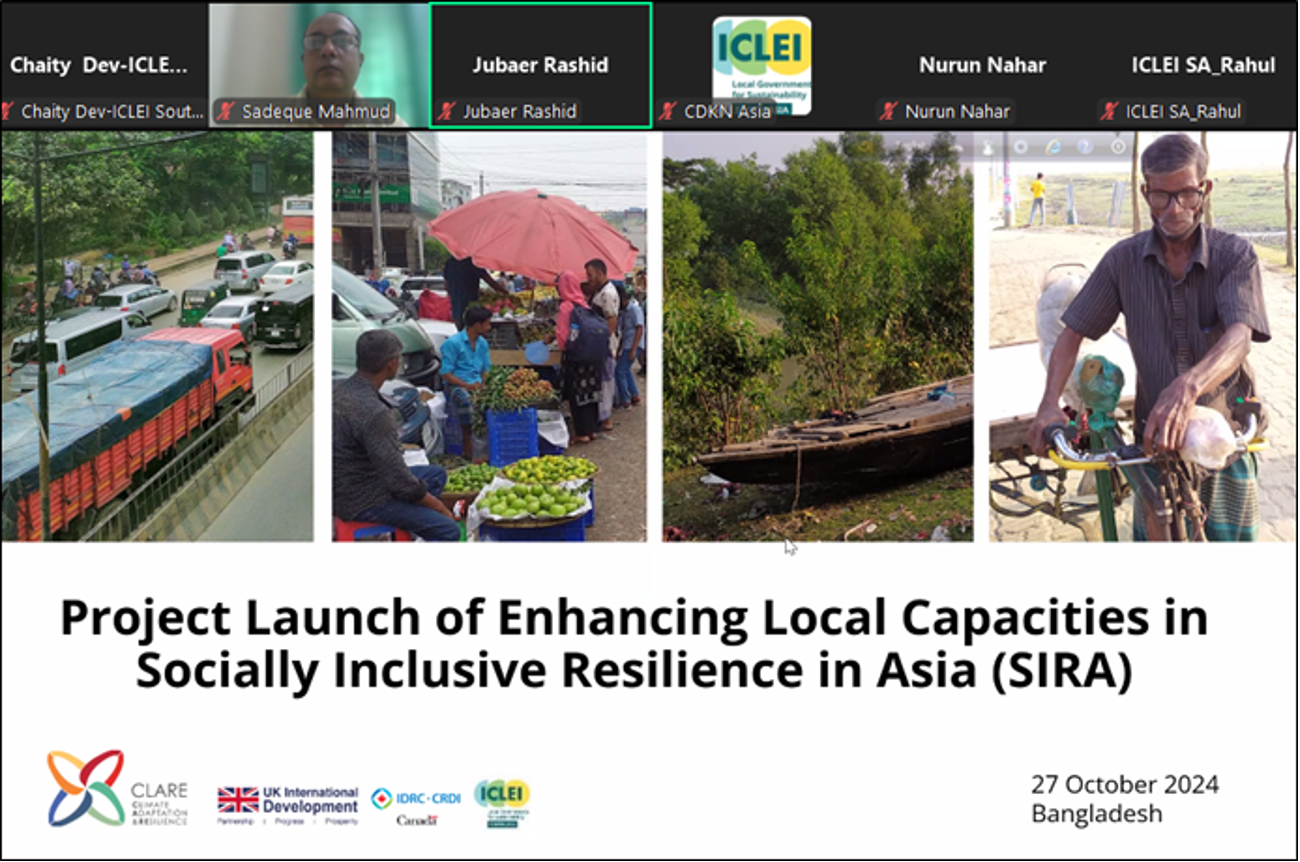SIRA Project launched in Bangladesh to boost inclusivity, local expertise in climate resilience
/
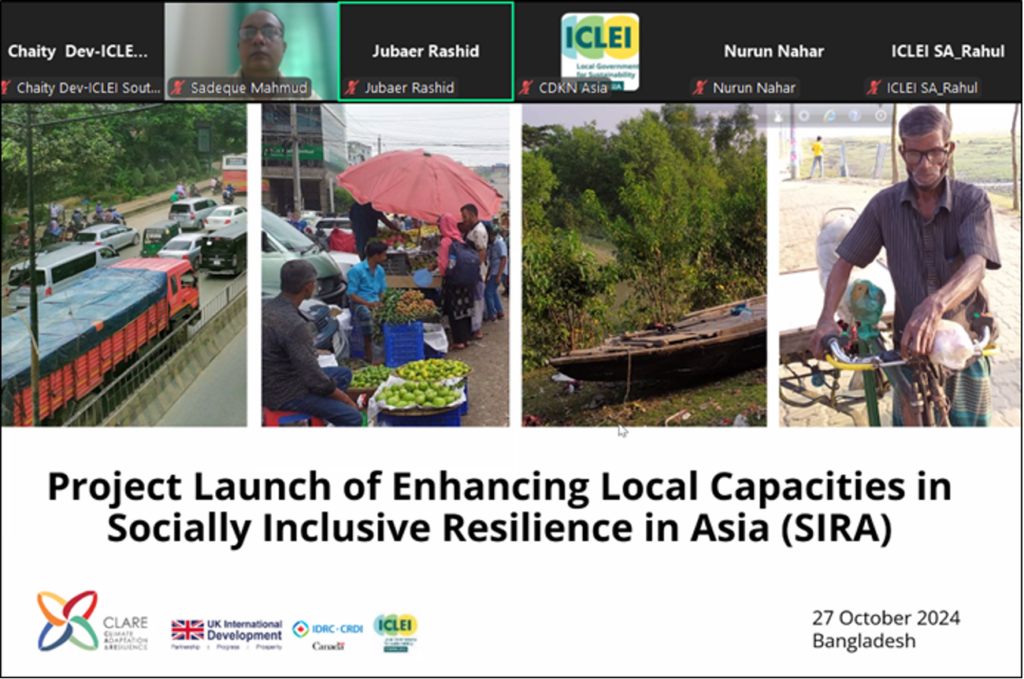
The “Enhancing Local Capacities in Socially Inclusive Resilience in Asia” (SIRA) Project was launched in Bangladesh with a workshop last October 27, 2024 via Zoom.
The “Enhancing Local Capacities in Socially Inclusive Resilience in Asia” (SIRA) Project gathered stakeholders from various sectors in Bangladesh, in a workshop to identify the needs of local governments and institutions that will help build their capacities in inclusive climate resilience.
Stakeholders from national and local government offices, civil society organizations, climate practitioners, and academic institutions attended the workshop last October 27, 2024 via Zoom, which also served as the launch of the SIRA Project in Bangladesh.
Funded by UK Aid through the Foreign Commonwealth and Development Office (FCDO) and the International Development Research Centre, Canada through the Climate Adaptation and Resilience (CLARE) programme and under the implementation of the ICLEI Southeast Asia and South Asia Secretariats, the SIRA project aims to identify and address the immediate capacity needs of local governments in pursuing climate action that is inclusive and sustainable through a systematic and phased capacity strengthening programme anchored on south-south cooperation among four Asian countries: Bangladesh, Indonesia, Nepal, and the Philippines.
During the launching workshop, the stakeholders identified and discussed specific technical and knowledge-based needs among local governments and climate adaptation professionals in Bangladesh to enable effective, socially inclusive resilience initiatives.
Need for social inclusivity, capacity-building, and alignment
Emani Kumar, Executive Director of ICLEI South Asia and Deputy Secretary General of ICLEI, emphasized in his welcome message during the workshop that the SIRA Project seeks to build social inclusivity within climate resilience efforts, ensuring that vulnerable and marginalized groups have a voice and play an active role in resilience planning and adaptation. He also expressed ICLEI’s commitment to fostering knowledge exchange and technical support for municipalities in Bangladesh.
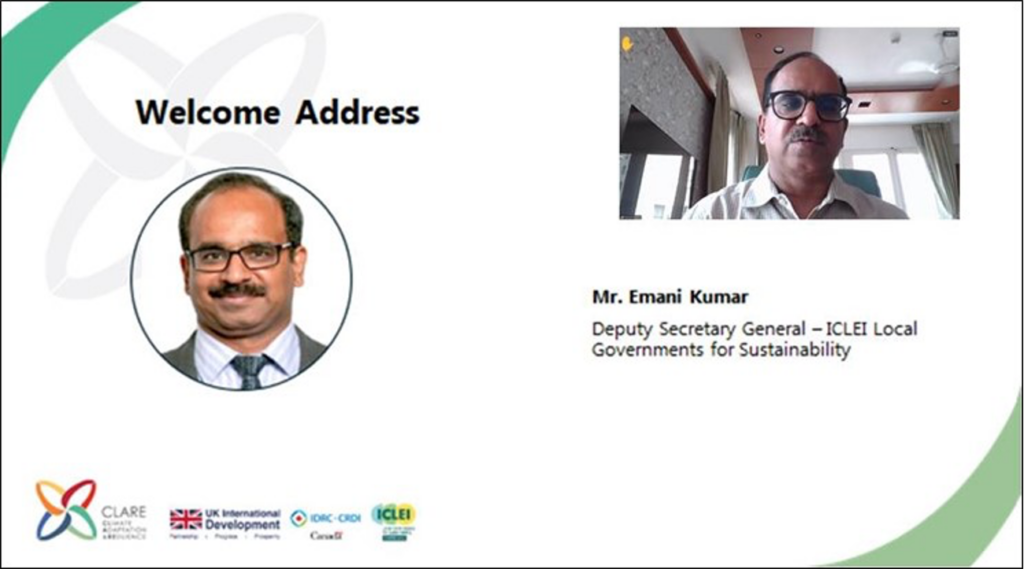
Emani Kumar, Executive Director of ICLEI South Asia, delivers his welcome address during the SIRA Project launch in Bangladesh, October 27, 2024 via Zoom.
The workshop’s chief guest speaker, Dr. Nurun Nahar, Additional Secretary of the Bangladesh Planning Commission’s Programming Division, reiterated Bangladesh’s commitment to climate resilience and commended ICLEI for focusing on marginalized groups, including women and youth.
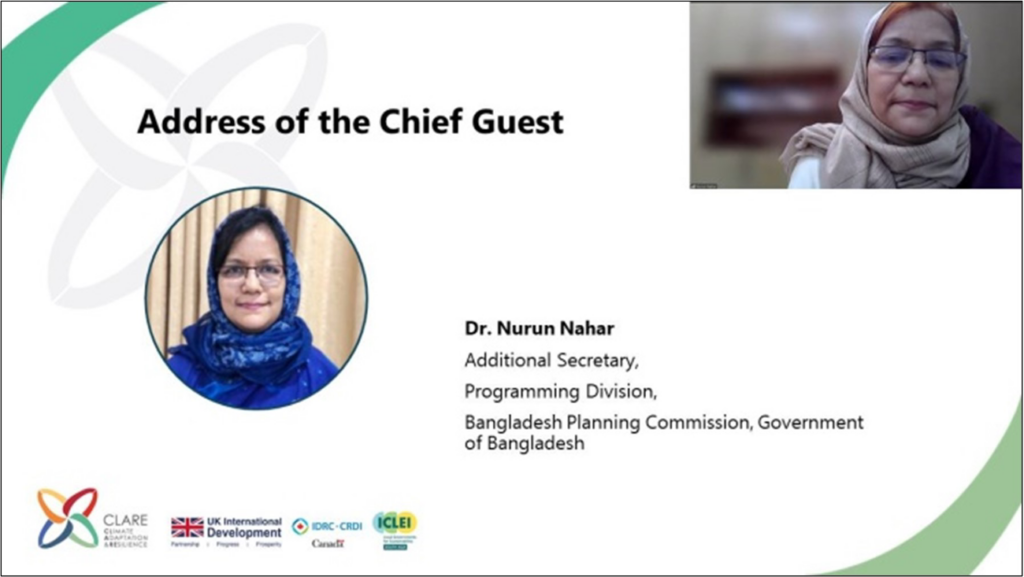
Dr. Nurun Nahar, Additional Secretary of the Bangladesh Planning Commission’s Programming Division, delivers a message as the chief guest during the SIRA Project launch in Bangladesh, October 27, 2024 via Zoom.
As a guest speaker, Mohammad Hasan Arif, Additional Secretary at the Economic Relations Division of the Government of Bangladesh, also emphasized the importance of inclusive participation of local governments from all regions of Bangladesh and involving women and disadvantaged groups in local resilience planning. He highlighted the project’s potential to empower local governments as key responders to climate challenges.
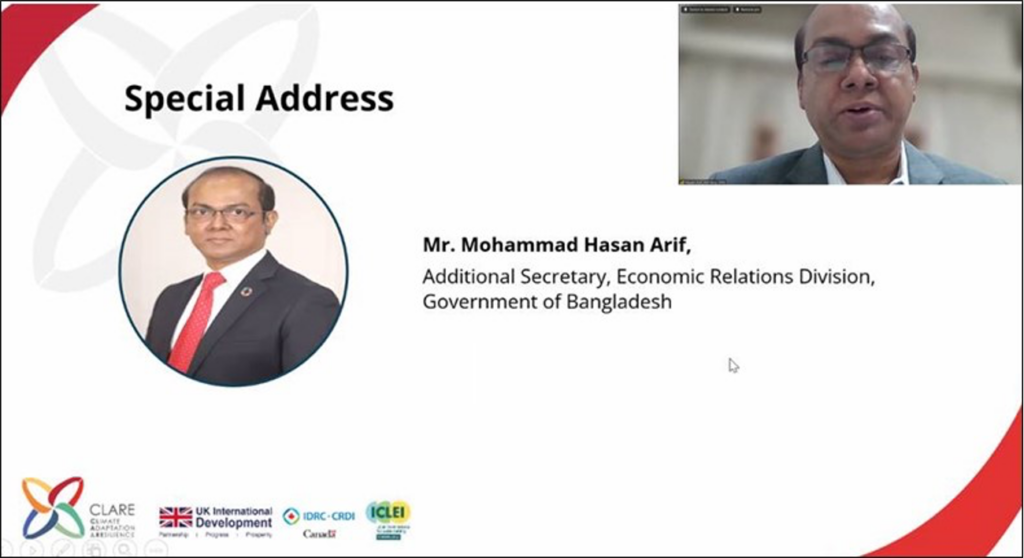
Mohammad Hasan Arif, Additional Secretary at the Economic Relations Division of the Government of Bangladesh, delivers a special address as a guest during the SIRA Project launch in Bangladesh, October 27, 2024 via Zoom.
Another guest speaker, Marcus Davies, Political Counselor at the Canadian High Commission in Bangladesh, talked about the practical implications of global negotiations on sustainable urbanization, stressing the need for tangible actions and alignment of local climate adaptation strategies with national policies.

Marcus Davies, Political Counselor at the Canadian High Commission in Bangladesh, delivers a special address as a guest during the SIRA Project launch in Bangladesh, October 27, 2024 via Zoom.
Meanwhile, Bedoshruti Sadhukhan, Associate Director of ICLEI South Asia, gave an overview of the project during the workshop and facilitated a discussion on the critical capacity needs of local governments and institutions, which highlighted the demand for technical expertise and solutions to address disparities in capacity across agencies to undertake climate resilience actions effectively.
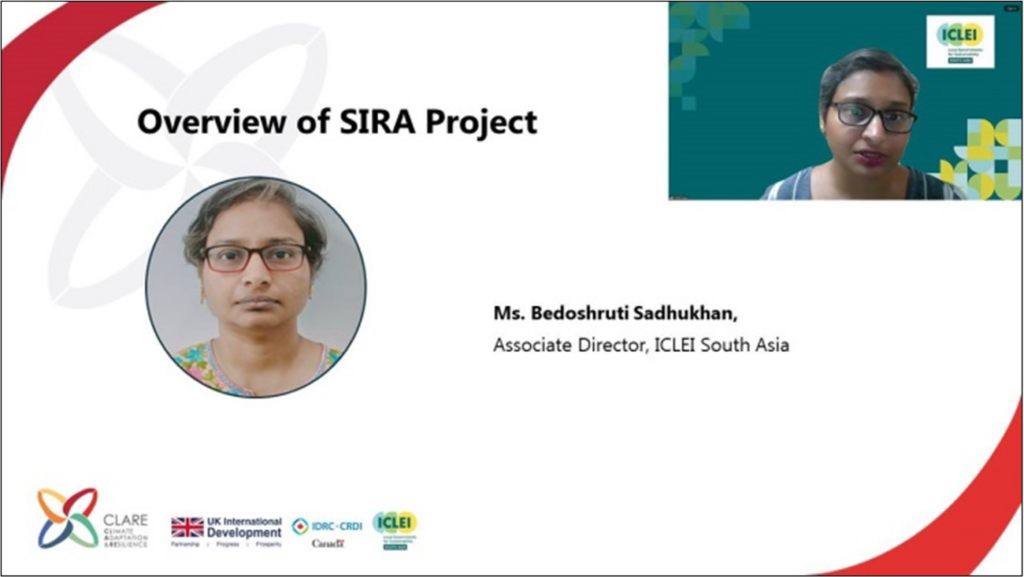
Bedoshruti Sadhukhan, Associate Director of ICLEI South Asia, gave an overview of the project during the workshop and facilitated a discussion on the critical capacity needs of local governments and institutions, during the SIRA Project launch in Bangladesh, October 27, 2024 via Zoom.
Inclusion of climate-vulnerable regions, increased local coordination
The workshop included an open discussion to gather insights from stakeholder-attendees on climate impacts, resilience strategies, and capacity-building needs in Bangladesh, moderated by Md. Jubaer Rashid, Country Representative of ICLEI South Asia.
Key insights from the stakeholders include involving geographically vulnerable southern and coastal regions and considering the distinct resilience-related challenges of regions; increasing collaboration in the regional and municipal level; strengthening coordination and communication with stakeholders; aligning similar ongoing initiatives; implementing micro-level projects for practical application; creating a centralized climate platform for local governments; and appointing a “climate focal person” in each municipality to oversee climate actions.
Key findings from KIIs
The findings highlighted several challenges in climate resilience efforts, including the need to address knowledge gaps, resource constraints, underrepresentation of various community sectors in climate decision-making, and disruptions to local climate initiatives.
To address knowledge gaps, the findings emphasized the importance of enhancing the technical capacity and expertise of local officials in climate resilience planning, relevant policies, and accessing climate finance for them to develop and implement climate adaptation measures effectively.
The resource constraints identified included a lack of financial resources, insufficient manpower, and limited institutional capacity for implementing climate projects. Additional barriers such as transparency issues, difficulties in proposal submissions, and bureaucratic obstacles were also noted as restrictions on accessing climate finance.
The findings also noted that political engagement was a critical factor for successful climate-related projects.
As for the continuity of local climate initiatives, the findings revealed that high staff turnover within the local government is believed to cause the disruption of the initiatives and complication of long-term planning. Mismatches between national policies and local implementation, weak governance structures, and unclear agency roles were also noted to further hinder progress.
Additionally, the disconnect between academic research and field implementation was noted to reduce collaboration opportunities.
Potential areas of focus for capacity building
During the workshop, potential areas of focus for the project’s capacity building efforts were identified, which were the improvement of solid waste management to address public health risks during climate events, especially in areas like Kushtia and Sirajganj where outbreaks of diseases have been observed; and structuring efforts to include women and marginalized groups in climate action to ensure their meaningful participation in the decision-making and implementation of initiatives.
Around 30 stakeholders attended, representing various government offices, organizations, and institutions such as Mongla Port Municipality, Lalmonirhat Municipality, Nilphamari Municipality, Singra Municipality, Dhaka North City Corporation, GIZ, ICCCAD, C3ER at Brac University, Municipal Association of Bangladesh (MAB), Kushtia Municipality, Independent University, and the Bangladesh Institute of Planners (BIP).
ICLEI South Asia will incorporate the findings from the launching workshop into the SIRA Project’s Country Needs Assessment (CNA) report for Bangladesh.
The CNA will be used to guide targeted training sessions, technical support, and resource allocation for the SIRA Project implementation in Bangladesh, ensuring the project’s long-term impact and the sustainability of capacity-building efforts.
CLARE is a UK-Canada framework research programme on Climate Adaptation and Resilience, aiming to enable socially inclusive and sustainable action to build resilience to climate change and natural hazards. CLARE is an initiative jointly designed, funded and run by the UK Foreign Commonwealth and Development Office and Canada’s International Development Research Centre. CLARE is primarily funded by UK aid from the UK government, along with the International Development Research Centre, Canada.
Written by Jameela Antoniette Mendoza, Communications Assistant, ICLEI Southeast Asia
Categories
Countries
CLARE Pillars
CLARE Themes
CLARE Topics
Published
CLARE Projects
CLARE Partners


